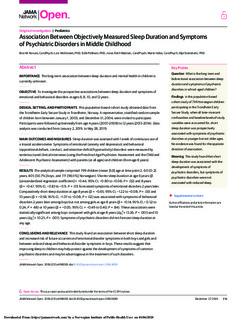Association Between Objectively Measured Sleep Duration and Symptoms of Psychiatric Disorders in Middle Childhood
Ranum, Bror M.; Wichstrøm, Lars; Pallesen, Ståle; Falch-Madsen, Jonas; Halse, Marte Kathrine; Steinsbekk, Silje
Journal article, Peer reviewed
Published version

Åpne
Permanent lenke
http://hdl.handle.net/11250/2638159Utgivelsesdato
2019Metadata
Vis full innførselSamlinger
- Institutt for psykologi [3085]
- Publikasjoner fra CRIStin - NTNU [38047]
Sammendrag
Importance The long-term association between sleep duration and mental health in children is currently unknown.
Objective To investigate the prospective associations between sleep duration and symptoms of emotional and behavioral disorders at ages 6, 8, 10, and 12 years.
Design, Setting, and Participants This population-based cohort study obtained data from the Trondheim Early Secure Study in Trondheim, Norway. A representative, stratified random sample of children born between January 1, 2003, and December 31, 2004, were invited to participate. Participants were followed up biennially from age 4 years (2007-2008) to 12 years (2013-2014). Data analysis was conducted from January 2, 2019, to May 28, 2019.
Main Outcomes and Measures Sleep duration was assessed with 1 week of continuous use of a triaxial accelerometer. Symptoms of emotional (anxiety and depression) and behavioral (oppositional defiant, conduct, and attention-deficit/hyperactivity) disorders were measured by semistructured clinical interviews (using the Preschool Age Psychiatric Assessment and the Child and Adolescent Psychiatric Assessment) with parents (at all ages) and children (from age 8 years).
Results The analytical sample comprised 799 children (mean [SD] age at time point 2, 6.0 [0.2] years; 405 [50.7%] boys; and 771 [96.5%] Norwegian). Shorter sleep duration at age 6 years (β [unstandardized regression coefficient] = −0.44; 95% CI, −0.80 to −0.08; P = .02) and 8 years (β = −0.47; 95% CI, −0.83 to −0.11; P = .01) forecasted symptoms of emotional disorders 2 years later. Comparatively short sleep duration at age 8 years (β = −0.65; 95% CI, −1.22 to −0.08; P = .03) and 10 years (β = −0.58; 95% CI, −1.07 to −0.08; P = .02) was associated with symptoms of behavioral disorders 2 years later among boys but not among girls at age 8 years (β = −0.14; 95% CI,− 0.52 to 0.24; P = .48) or 10 years (β = −0.05; 95% CI, = −0.49 to 0.40; P = .84). These associations were statistically significant among boys compared with girls at age 8 years (Δχ21 = 13.26; P < .001) and 10 years (Δχ21 = 10.25; P = .001). Symptoms of psychiatric disorders did not forecast sleep duration at any age.
Conclusions and Relevance This study found an association between short sleep duration and increased risk of future occurrence of emotional disorder symptoms in both boys and girls and between reduced sleep and behavioral disorder symptoms in boys. These results suggest that improving sleep in children may help protect against the development of symptoms of common psychiatric disorders and may be advantageous in the treatment of such disorders.
